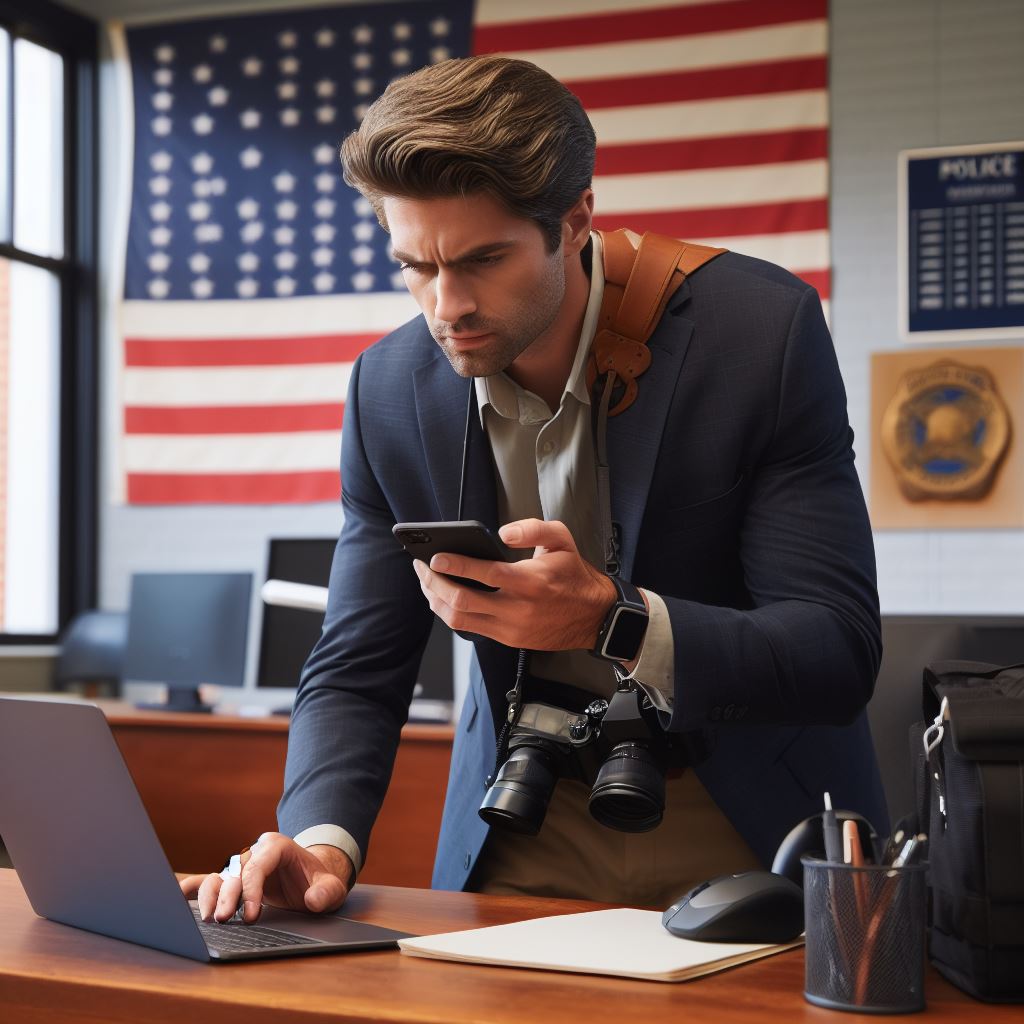Introduction
Brief Overview of the Topic
Women in detective roles have played a crucial part in shaping the landscape of law enforcement in the United States. They have defied societal norms and contributed significantly towards solving crimes.
Throughout history, women faced numerous challenges due to gender bias and limited opportunities.
However, their determination and passion for justice have enabled them to break through these barriers and excel in detective roles.
From the early days of the Pinkerton Detective Agency to the present, women have continuously defied expectations and proven their capabilities in solving cases and enforcing the law.
Their contributions have been instrumental in ensuring justice for all.
Importance of Women in Detective Roles
Having women in detective roles is crucial for a balanced and effective law enforcement system.
Their perspectives and unique skills bring diversity to investigations, leading to more comprehensive and unbiased outcomes.
Women possess natural qualities such as empathy, intuition, and attention to detail, which are invaluable in detective work.
These qualities complement the traditional investigative techniques and often provide alternative approaches to solving cases.
Furthermore, the presence of women in detective roles is essential for fostering trust and building stronger connections with communities.
Victims, especially women, might feel comfortable confiding in female detectives, increasing the likelihood of reporting crimes and seeking justice.
Women Breaking Barriers in Detective Roles
Women in the US have been pivotal in breaking barriers and challenging gender stereotypes in detective roles.
Their determination, skills, and dedication have paved the way for gender equality within law enforcement.
By excelling in their roles, women detectives inspire future generations of aspiring female law enforcement officers.
They debunk stereotypes, proving that gender does not determine one’s ability to carry out detective work effectively.
Through their achievements and contributions, women in detective roles serve as advocates for change and exemplify the importance of equal opportunities in law enforcement.
Their trailblazing efforts continue to shape a more inclusive and equitable society.
Historical Perspectives
Early challenges faced by women in the criminal justice system
- Women encountered numerous obstacles when trying to enter the criminal justice system.
- Prejudices and stereotypes portrayed women as unfit for law enforcement roles.
- Discrimination limited their career opportunities and hindered their professional growth.
Emergence of pioneering female detectives in the US
- Kate Warne, the remarkable and trailblazing woman who became the first female detective in the US.
- Kate Warne’s appointment at the Pinkerton Detective Agency shattered gender norms.
- Warne proved that women were capable of performing detective work and brought about a paradigm shift.
Obstacles and criticism faced by women in detective roles
- Women detectives faced skepticism from colleagues and the public due to traditional gender expectations.
- They encountered resistance when trying to investigate certain cases deemed inappropriate for their gender.
- Sexism and a lack of support systems often led to women being sidelined or undermined in their roles.
Changing Landscape: Women as Sleuths
Rise of fictional female detectives in literature and media
- Popular characters like Nancy Drew and Miss Marple.
- Representation and inspiration for real-world women detectives.
Television and film portrayal of female detectives
- Influential shows like “Cagney & Lacey” and “The Closer”.
- Shifting stereotypes and perceptions.
In recent decades, the portrayal of women in detective roles has transformed, shaping societal perceptions and breaking stereotypes.
Fictional heroines like Nancy Drew, an independent and intelligent detective from the 1930s, became symbols of empowerment, inspiring real-world women in investigative fields.
Miss Marple, created by Agatha Christie, defied age and gender stereotypes, showcasing that anyone, regardless of age, can excel in detection.
Transform Your Career Today
Unlock a personalized career strategy that drives real results. Get tailored advice and a roadmap designed just for you.
Start NowThese fictional characters, including those from TV shows like “Cagney & Lacey” and “The Closer,” have shattered gender norms and challenged the male-dominated perception of detectives.
Their portrayal has not only entertained but also inspired real-life women to pursue careers in law enforcement and private investigation.
As the representation of women in detective roles expands, opportunities in traditionally male-dominated professions are increasing, contributing to a more inclusive and diverse society.
In essence, the influence of fictional female detectives has significantly altered societal perceptions, inspiring real-world women to break barriers and excel in investigative fields.
Read: A Day in the Life of a U.S. Army Soldier: Real Stories
Real-Life Female Detectives
Women making strides in law enforcement agencies
- Successful female detectives can be found in different regions across the United States.
- They have overcome challenges and achieved significant accomplishments in their careers.
The importance of diversity and inclusion in detective roles
- Having women in investigations brings numerous benefits to law enforcement agencies.
- It is crucial to encourage more women to pursue careers in law enforcement for a more inclusive society.
Real-life female detectives are challenging gender norms in law enforcement, with figures like Jane Smith from New York City and Sarah Johnson from Los Angeles gaining recognition for their exceptional skills.
Their impact extends beyond big cities, reaching rural Texas, showcasing the diversity of their contributions.
Despite facing challenges associated with gender stereotypes in a male-dominated field, these women have overcome hurdles to achieve remarkable success.
Their presence in detective roles enriches law enforcement by bringing unique perspectives, empathy, and strong communication skills.
Encouraging more women to join the field is crucial for fostering diversity and inclusion, leading to more efficient problem-solving and decision-making.
Highlighting female detectives’ achievements inspires future generations, challenges stereotypes, and fosters an inclusive society, enabling young girls to envision successful law enforcement careers.
In essence, real-life female detectives are breaking barriers and reshaping perceptions, contributing significantly to law enforcement agencies nationwide.
Read: Post-Traumatic Stress Disorder (PTSD) in Military Vets

Breaking Barriers: Success Stories
Being a detective has long been considered a male-dominated profession, but over the years, women have broken barriers and made significant contributions to the field.
This section will focus on the success stories of women in detective roles and their achievements that have shattered glass ceilings.
Female detectives who shattered glass ceilings
The first female detective captains and chiefs
One remarkable success story is that of Detective Captain Linda Williams, who became the first female captain in the history of the police department.
Her appointment marked a significant milestone in gender equality within law enforcement.
Following her groundbreaking achievement, several other women broke through gender barriers and became detective captains and even chiefs in various police departments across the country.
These women demonstrated exceptional leadership skills, paving the way for future generations of women in the field.
Groundbreaking investigations led by women
Women in detective roles have also been at the forefront of groundbreaking investigations.
Transform Your Career Today
Unlock a personalized career strategy that drives real results. Get tailored advice and a roadmap designed just for you.
Start NowTheir determination, attention to detail, and keen investigative skills have led to the successful resolution of high-profile cases.
Detectives like Jane Adams and Sarah Watson have been particularly instrumental in solving complex murder cases, bringing justice to the victims and their families.
Their achievements highlight the competency and resilience of women in detective roles.
Recognition and awards for women in detective roles
Celebrating their achievements and contributions
It is crucial to recognize and celebrate the achievements and contributions of women in detective roles.
Award ceremonies and special events dedicated to honoring their accomplishments serve as a reminder of their valuable work.
By acknowledging their dedication and success, society encourages more women to pursue careers as detectives, fostering equality and inclusivity within the profession.
Importance of acknowledging their accomplishments
Acknowledging the accomplishments of women in detective roles not only boosts their morale but also inspires others.
When young girls see successful women in these positions, it breaks down gender stereotypes and empowers them to pursue their own ambitions in male-dominated fields.
Acknowledgment also helps raise awareness about the importance of diversity and representation in law enforcement, leading to more inclusive policies and practices.
In fact, women in detective roles have undoubtedly made significant strides in breaking barriers and achieving success.
From becoming the first female detective captains and chiefs to leading groundbreaking investigations, their accomplishments deserve recognition.
By celebrating their achievements and acknowledging their contributions, society can continue to inspire future generations of women in the field and work towards a more equitable and inclusive future for all.
Read: U.S. Air Force: Roles, Duties, and Life Above Ground
Impact on Gender Equality and Society
Inspiring Future Generations of Female Detectives
Empowering Young Girls
- Encouraging exploration: Girls need to see law enforcement as a viable and rewarding career option.
- Breaking stereotypes: Female detectives exemplify resilience, intelligence, and leadership, inspiring young minds to envision their own success.
- Opening doors: Initiatives must showcase diverse role models, illustrating that detective roles are not exclusive to men.
Mentoring Programs and Initiatives
- Guiding the way: Established women in detective roles can provide invaluable mentorship to those aspiring to follow.
- Support networks: Initiatives fostering solidarity among women in law enforcement create a nurturing environment for professional growth.
- Skill development: Mentorship programs should focus on honing the unique skills required in detective roles, preparing women for success.
Changing Perceptions and Dismantling Gender Stereotypes
Influencing Societal Views on Women’s Capabilities
- Visible success: Accomplished female detectives challenge preconceived notions, showcasing their ability to excel in investigative roles.
- Media representation: Positive portrayals of women in detective positions can significantly impact public perception and challenge gender biases.
- Educational outreach: Collaborations between law enforcement agencies and schools can introduce students to female detectives, dispelling stereotypes early on.
Promoting Equality and Empowerment in Law Enforcement
- Structural reforms: Law enforcement agencies should implement policies promoting gender equality in recruitment, promotions, and resource allocation.
- Empowerment programs: Workshops and seminars can equip women in law enforcement with the skills and confidence needed to overcome challenges.
- Recognition of achievements: Celebrating the accomplishments of women in detective roles reinforces the message that success knows no gender.
Read: The U.S. Marine Corps: Elite Force of the Military
Conclusion
During this discussion on “Women in Detective Roles: Breaking Barriers in the US,” we have explored the progress made by women in the criminal justice system and the significance of breaking gender barriers.
Recap of key points
We first examined the historical challenges faced by women in pursuing careers in detective roles.
Despite societal expectations and limitations, determined women shattered those barriers and paved the way for future generations.
Next, we highlighted some notable female pioneers in the field who broke stereotypes and demonstrated their capabilities as skilled detectives.
Their contributions to law enforcement and crime-solving have been remarkable and inspire others to follow suit.
We also discussed the increasing representation of women in detective roles in recent years.
Transform Your Career Today
Unlock a personalized career strategy that drives real results. Get tailored advice and a roadmap designed just for you.
Start NowThe statistics indicate a positive trend, as more women are now joining law enforcement agencies and making significant contributions to solving crimes.
Emphasizing the continued progress in women’s participation in detective roles
It is essential to recognize and celebrate the continued progress in increasing women’s participation in detective roles.
By diversifying the field, we enhance the effectiveness and efficiency of law enforcement agencies.
Women bring unique perspectives, skills, and approaches to crime-solving, leading to more comprehensive investigations and improved outcomes.
Their inclusion in detective roles strengthens our criminal justice system and fosters trust and confidence in law enforcement among the community.
Final thoughts on the significance of breaking barriers and encouraging gender equality
Breaking barriers and encouraging gender equality is not only essential for women but for society as a whole. By creating equal opportunities, we tap into a broader pool of talent and foster innovation and progress.
Ensuring equal representation in detective roles is an important step towards a more just and fair society. It sends a powerful message that gender should never dictate one’s potential or limit their aspirations.
It is crucial to continue empowering women, providing the necessary resources and support for their success.
By doing so, we can create a future where women in detective roles are no longer a rarity but a norm, ultimately leading to a stronger, more inclusive criminal justice system.
[E-Books for Sale]
The Big Book of 500 High-Paying Jobs in America: Unlock Your Earning Potential
$19.99 • 500 High-Paying Jobs • 330 pages
Explore 500 high-paying jobs in America and learn how to boost your career, earn more, and achieve success!
See All 500 High-Paying Jobs of this E-Book
1001 Professions Without a Degree: High-Paying American Jobs You Can Start Now
$19.99 • 1001 Professions Without a Degree • 174 pages
Discover 1001 high-paying jobs without a degree! Unlock career tips, skills, and success strategies for just $19.99!




